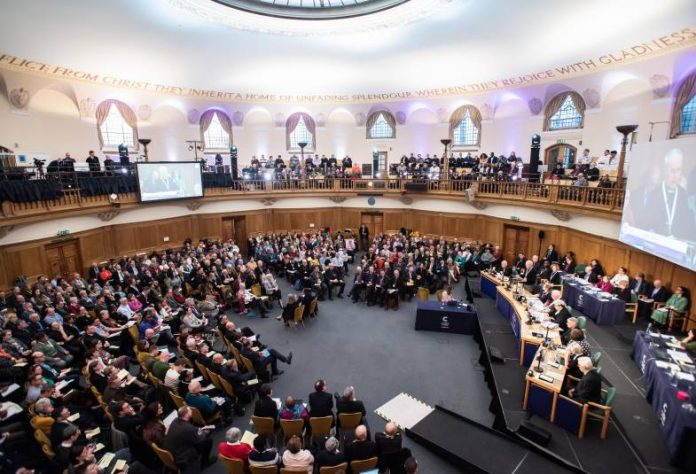The St Hugh’s Conversations, a series of secret meetings between conservative/evangelical groupings and liberal/progressive Church members, held an “off the agenda” meeting on the first day of General Synod in February. The meeting took place just ahead of Synod’s decisive vote to approve the blessing of gay unions.
Dr Helen King, a lay synod member from Oxford and a participant in the Conversations, summarised her experience of February’s General Synod in a blog post. She recorded the following taking place on Monday 6th February: “Off the agenda, an emergency meeting of the St Hugh’s Conversation – the group set up by the Bishop of Oxford three years ago to bring together prominent liberals and conservatives and to which I belong as a result of my position as vice-chair of the Gender & Sexuality Group – was called to discuss whether members want to propose in the debate the conservatives’ aim for ‘structural differentiation’ (separate bishops, separate training, separate ordinations, maybe difference provinces). This was inconclusive.”
In November. English Churchman revealed the existence of the St Hugh’s Conversations a secret liberal-conservative gathering, convened by Bishop Steven Croft of Oxford. Some participants had written online about how these meetings were seeking to reach structural co-existence within a Church of England that permits same-sex marriages. Bishop Croft’s Together in Faith and Loveproposed the creation of a separate jurisdiction for conservatives. The Bishop’s booklet was published last year after consultation with St Hugh’s members, including Revd Vaughan Roberts, who also produced a response to Bishop Croft.
Dr King revealed, “This response came out almost immediately Bishop Steven’s booklet appeared, and both writers had shared drafts before publication.”
According to her blog (shared-conversations.com), the St Hugh’s Conversations: “[were] set up about three years ago by Bishop Steven with some leaders of large local conservative Evangelical churches, Evangelical Group on General Synod (EGGS) and CEEC, and gradually seems to have expanded to include others from the conservative/traditional and the inclusive/progressive end of the C of E.”
English Churchman had asked the Church of England Evangelical Council (CEEC) to clarify the extent of their involvement in the St Hugh’s Conversations. Helen Catt, CEEC Communication Director gave this response: “For several years, CEEC has been talking with both those who share our views and those who disagree on the topic of human sexuality. CEEC has explored, in a number of articles, the idea that visible and robust differentiation might provide a solution to the fundamental theological incompatibility that exists around this issue within the CofE.”
On hearing about the St Hugh’s meeting during synod, one evangelical vicar told English Churchman, “They have moved beyond being a talking shop, as originally claimed. They are not in conversation with liberals but in collusion with them. They represent no-one but themselves, yet they are acting as brokers behind the scenes to secure their preferred outcome and present it as the single evangelical strategy. “










